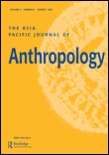
Asia Pacific Journal of Anthropology
Scope & Guideline
Unveiling the Complexities of Human Societies
Introduction
Aims and Scopes
- Cultural Diversity and Identity:
The journal emphasizes the exploration of cultural identities across various communities in the Asia Pacific, examining how globalization and migration affect cultural practices and social norms. - Migration and Transnationalism:
A core focus is placed on the experiences of migrants and the implications of transnational connections, particularly in relation to family structures, labor, and social networks. - Ethnographic Methodologies:
The journal promotes the use of ethnographic methods to capture the complexities of human experiences, offering rich qualitative insights into various cultural phenomena. - Social and Political Dynamics:
It addresses the intersection of social structures and political dynamics, especially in contexts of conflict, migration, and human rights, providing critical analyses of power relations. - Environmental Anthropology:
The journal also includes studies that investigate the relationship between communities and their environments, focusing on issues of sustainability, resource management, and ecological impacts. - Media and Cultural Production:
There is a growing interest in how media shapes cultural narratives and identity, exploring the role of digital platforms in contemporary anthropological discourse.
Trending and Emerging
- Intercultural Families and Global Intimacies:
There is an increasing focus on the dynamics of intercultural marriages and families, exploring how globalization influences intimate relationships and cultural practices. - Digital Anthropology:
The rise of digital technologies and social media has prompted a surge in research examining their impact on cultural practices, identity formation, and social interactions. - Health and Wellbeing:
Emerging themes related to health, including the socio-political aspects of health care access and the experiences of marginalized populations, are gaining traction. - Environmental Justice and Activism:
The journal is increasingly publishing work that addresses environmental issues, sustainability practices, and local activism in response to climate change. - Migration and Refugee Studies:
Research exploring the complexities of migration, refugee experiences, and asylum-seeking processes is becoming increasingly prominent, reflecting global humanitarian concerns. - Cultural Production and Artivism:
There is a growing interest in the intersections of art, activism, and anthropology, particularly how cultural production serves as a form of resistance and community building.
Declining or Waning
- Traditional Anthropological Studies:
There seems to be a decline in interest in traditional ethnographic studies that focus solely on isolated communities without considering broader transnational influences. - Historical Anthropology:
The publication of papers focusing on historical contexts and colonial legacies has lessened, as contemporary issues and immediate cultural dynamics take precedence. - Static Cultural Representations:
There is a noticeable decrease in studies that present cultures as static entities; newer research tends to emphasize cultural fluidity and change. - Single-Site Case Studies:
The journal has shifted away from single-site case studies, opting instead for comparative analyses that incorporate multiple perspectives and contexts. - Overly Theoretical Approaches:
Papers that rely heavily on abstract theoretical frameworks without clear ethnographic grounding have become less common, as there is a push for more applied and practical anthropological research.
Similar Journals
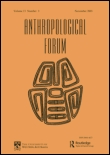
Anthropological Forum
Fostering Critical Conversations in AnthropologyAnthropological Forum, an esteemed journal in the field of anthropology, is published by Routledge Journals, Taylor & Francis Ltd. With an ISSN of 0066-4677 and an E-ISSN of 1469-2902, the journal has cemented its reputation for fostering critical discussions and innovative research since its inception in 1963. Covering a broad range of topics within anthropology, it has achieved an impressive Q1 ranking in the category of Anthropology and a Q2 ranking in Arts and Humanities (miscellaneous) in 2023, showcasing its pivotal role in advancing scholarly discourse. With a Scopus ranking placing it in the top 10% of its field, the journal provides valuable insights into contemporary anthropological issues, making it an essential resource for researchers, professionals, and students alike. Although not an open-access journal, the comprehensive studies and articles published within its pages contribute significantly to the academic and professional community. Addressed out of Milton Park, Abingdon, UK, the Anthropological Forum remains a seminal platform for disseminating high-quality anthropological research.
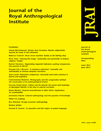
JOURNAL OF THE ROYAL ANTHROPOLOGICAL INSTITUTE
Illuminating the Rich Tapestry of HumanityJOURNAL OF THE ROYAL ANTHROPOLOGICAL INSTITUTE, published by Wiley, stands as a prestigious platform for scholarly discourse in the field of anthropology. With an ISSN of 1359-0987 and an E-ISSN of 1467-9655, this journal has been a vital resource for researchers, professionals, and students since its inception, featuring contributions that push the boundaries of understanding in both cultural and social anthropology. The journal’s rigorous peer-review process affirms its high academic standards, reflected in its top-tier Q1 rankings in both the Anthropology and Arts and Humanities categories for 2023. With a current ranking of #78 out of 502 in Social Sciences Anthropology and #138 out of 552 in Miscellaneous Arts and Humanities, it inhabits a critical space within academia, addressing seminal issues and innovative research. While the journal is not open access, it remains accessible to those affiliated with institutions that provide subscriptions, ensuring that groundbreaking anthropological insights are disseminated widely within the academic community. As it converges from 1995 to the present, the JOURNAL OF THE ROYAL ANTHROPOLOGICAL INSTITUTE continues to shape the landscape of anthropological research, engaging a diverse readership eager to explore the intricate tapestry of human cultures.
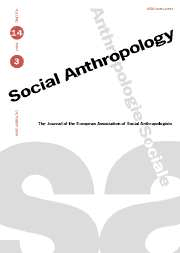
Social Anthropology
Cultivating Scholarly Dialogue on Contemporary IssuesSocial Anthropology is a leading journal published by BERGHAHN JOURNALS, focusing on the diverse and dynamic field of anthropology. With an ISSN of 0964-0282 and an E-ISSN of 1469-8676, this open-access journal has been a cornerstone of scholarly communication since its inception in 1982, becoming fully accessible to the public since 2022. Situated in the United States, the journal aims to disseminate high-quality research that explores sociocultural dimensions of human behavior across various contexts, addressing pressing contemporary issues through a multidisciplinary lens. With impressive rankings, including Q2 in Anthropology and Arts and Humanities, and strong positions in Sociology and Developmental Psychology according to Scopus metrics, Social Anthropology serves as an essential platform for researchers, professionals, and students committed to advancing our understanding of social practices and cultural norms. Its commitment to fostering intellectual discourse makes it a vital resource for those seeking to deepen their knowledge and insight into the anthropological landscape.
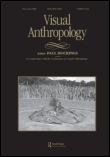
Visual Anthropology
Transforming Perspectives in Cultural StudiesVisual Anthropology is a distinguished journal published by Routledge Journals, Taylor & Francis Ltd in the United Kingdom. With an ISSN of 0894-9468 and E-ISSN 1545-5920, this journal focuses on the intersection of visual media and anthropological research, exploring the ways in which visual representations influence cultural practices and perceptions. Since its inception in 1987, Visual Anthropology has contributed significantly to the fields of Anthropology and Cultural Studies, earning a Q2 rank in both categories as of 2023. With a solid impact factor and strategic indexing, the journal maintains a vital place for scholars seeking to understand the visual dimensions of human behavior and societal structures. Although it operates under a traditional subscription model, its rigorous peer-review process ensures the dissemination of high-quality research. The journal invites researchers, professionals, and students alike to engage with cutting-edge studies that bridge visual culture and anthropological inquiry.
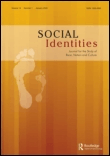
Social Identities
Connecting Disciplines to Understand Identity ComplexitiesSocial Identities is a distinguished academic journal published by Routledge Journals, Taylor & Francis Ltd, dedicated to advancing the understanding of social identities from a multidisciplinary perspective. With an ISSN of 1350-4630 and an E-ISSN of 1363-0296, this journal stands out in the sociology and political science disciplines, as evidenced by its impressive Q2 ranking and a Scopus percentile of 64th. Spanning from 1995 to 2024, it continually fosters scholarly discourse on the complexities of identity formation, representation, and the interplay between various social dynamics. Although the journal currently does not offer Open Access options, it remains a valuable resource for researchers and professionals seeking in-depth analysis and critical insights. Based in the United Kingdom, Social Identities is a vital platform for both emerging scholars and established experts dedicated to exploring the nuances of how identities shape social structures and experiences.
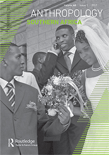
Anthropology Southern Africa
Illuminating the complexities of cultural phenomena in Southern Africa.Anthropology Southern Africa is a prestigious journal published by Routledge Journals, Taylor & Francis Ltd, and is dedicated to advancing the field of anthropology through rigorous scholarship and critical discourse. Established in 2013 and converging through 2024, this journal sets a high standard in its category, currently holding a Q2 classification in Anthropology and a Q1 ranking in Cultural Studies for the year 2023, ensuring its position as a significant contributor to social science research. With a robust Scopus ranking that places it in the 82nd percentile for Cultural Studies and the 67th percentile for Anthropology, Anthropology Southern Africa serves as an essential platform for researchers, professionals, and students engaged in anthropological inquiry and cultural analysis. Although it is not openly accessible, the publication prides itself on high-quality submissions that explore diverse cultural phenomena and anthropological perspectives, thereby inviting interdisciplinary engagement and fostering a global academic dialogue.
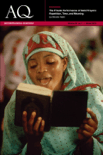
ANTHROPOLOGICAL QUARTERLY
Pioneering Perspectives in Anthropology and BeyondANTHROPOLOGICAL QUARTERLY, published by the George Washington University Institute of Ethnographic Research, stands as a vital resource in the field of anthropology and broader arts and humanities studies. With an ISSN of 0003-5491 and an E-ISSN of 1534-1518, this esteemed journal has been contributing to academic discourse since its establishment in 1981. The journal holds a respected position in both the Q2 category for Anthropology and the Q2 category for Arts and Humanities (miscellaneous), demonstrating its impact and relevance, as evidenced by its rank of #152 out of 502 in the Social Sciences sector for anthropology and rank of #179 out of 552 in the Arts and Humanities field. Researchers, professionals, and students can rely on ANTHROPOLOGICAL QUARTERLY for rigorous peer-reviewed articles that push the boundaries of ethnographic research and anthropological theory, addressing contemporary issues with scholarly precision. The journal’s commitment to fostering critical analysis and interdisciplinary perspectives establishes it as an essential platform for advancing knowledge within its diverse and dynamic field.

SCHWEIZERISCHES ARCHIV FUR VOLKSKUNDE
Exploring the Rich Tapestry of Folk CultureSCHWEIZERISCHES ARCHIV FUR VOLKSKUNDE, with ISSN 0036-794X, is a vital resource for scholars and practitioners in the fields of Arts and Humanities and Cultural Studies. Published by G KREBS VERLAGSBUCHHANDLUNG AG in Switzerland, this journal plays a crucial role in advancing the discourse surrounding folk culture, traditions, and anthropology. Despite its current ranking in the Q4 category for both Arts and Humanities and Cultural Studies, the journal serves as an essential platform for disseminating unique research findings and insights, contributing to a well-rounded understanding of diverse cultural practices. Researchers, professionals, and students are encouraged to explore the rich content produced between 2008 and 2014, and from 2017 to 2023, which reflects a commitment to fostering a multidisciplinary approach to folklore studies. By addressing the complexities of cultural dynamics, the journal not only promotes scholarly engagement but also enriches the academic community’s appreciation of folk traditions.

CURRENT ANTHROPOLOGY
Unveiling the Depths of Anthropology and ArchaeologyCURRENT ANTHROPOLOGY, published by the esteemed University of Chicago Press, stands as a premier journal in the fields of anthropology and archaeology, with an impressive impact factor that signifies its relevance and authority in the academic community. With both print (ISSN: 0011-3204) and digital formats (E-ISSN: 1537-5382), this journal provides a platform for groundbreaking research, theoretical advancements, and critical discussions that shape our understanding of human cultures and societies. Since its inception in 1962, CURRENT ANTHROPOLOGY has continually pushed the boundaries of knowledge and inquiry, earning a prestigious Q1 ranking in 2023 across multiple categories, including Social Sciences and Archaeology. Researchers and professionals alike rely on this journal not only for its rigorous peer-reviewed articles but also for its commitment to interdisciplinary approaches and innovative methodologies. While not currently offering open access, CURRENT ANTHROPOLOGY remains an essential resource for students and scholars eager to stay abreast of the latest developments in anthropological research.
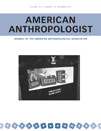
AMERICAN ANTHROPOLOGIST
Elevating interdisciplinary approaches in social sciences.American Anthropologist is a prestigious journal published by Wiley, dedicated to advancing the field of anthropology. With a rich publishing history dating back to 1888, it has become a leading platform for scholarly discourse, showcasing innovative research and diverse perspectives from around the globe. The journal holds impressive ranks within its categories, being recognized as Q1 in both Anthropology and Arts and Humanities, alongside a notable Scopus ranking of #36 out of 502 in Social Sciences. Its robust impact in academia is reflected in its emphasis on interdisciplinary approaches that resonate within the fields of social science and humanities. Researchers and students alike are encouraged to contribute to this vital resource that continues to shape anthropological thought and practice. For those interested, the journal is tailored for non-open access, ensuring the curation of high-caliber scholarly work accessible to a wide audience while supporting the standards of peer-reviewed publications.